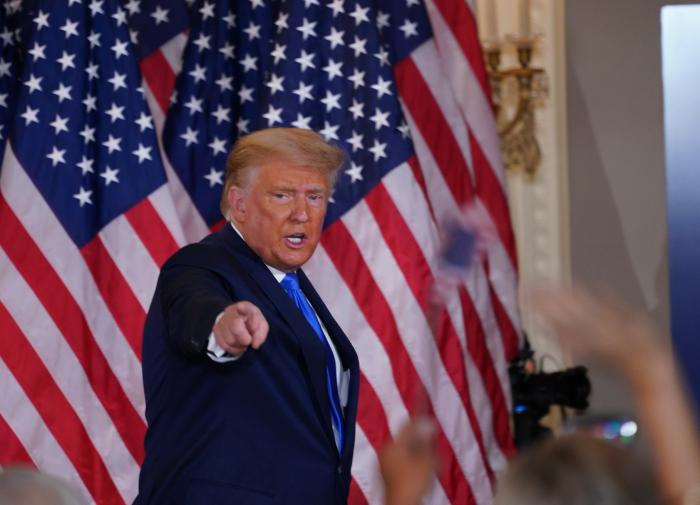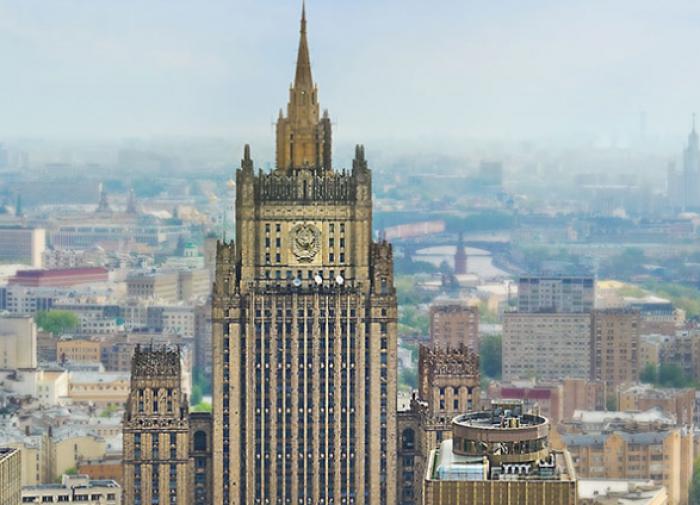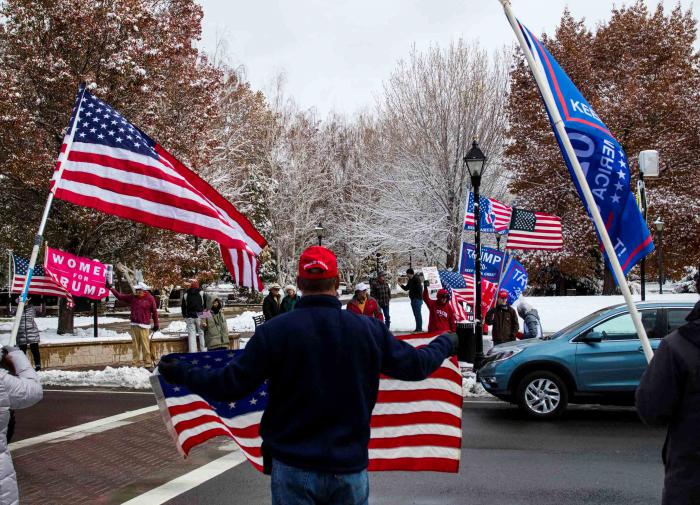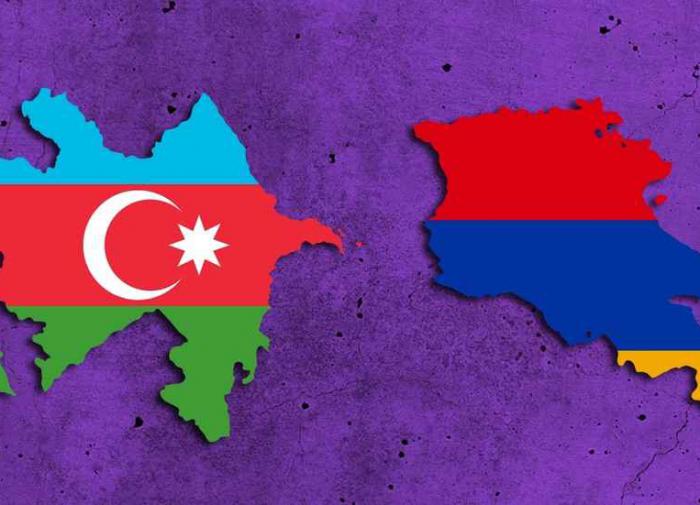In the aftermath of the 2020 election, many pundits were asking how Donald Trump could have garnered over 70,000,000 votes and made the presidential race much more competitive than pre-election polls indicated. After all, here was a man who repeatedly and unabashedly lied to his supporters, endangered their lives by encouraging them not to take precautions during a global pandemic, and openly remarked how his desire to win reelection was all about him, and not the good of the country.

But there is no great mystery to Trumpian cultism. The answer is as old as human nature itself.
The two philosophies routinely viewed as polar opposites on the political spectrum are communism and fascism. To many, this distinction seems ludicrous given that, under both systems, brutal dictators emerged, millions of people were killed, and fundamental freedoms and human rights were often viciously suppressed.
But two fundamental pillars that differentiate these ideologies are their views of human nature and intangibility vs. tangibility.
Communism, in theory, views human nature as fundamentally good. People will willingly give their labor, and often sacrifice material goods, for the betterment of their neighbors and society. The government exists to ensure that the labor is done and the material goods equitably distributed.
Because of this, the effectiveness of communism could be tangibly seen and measured, which, of course, meant that failures were just as visible as successes. To counter this, communist governments often felt compelled to hide economic hardships and exaggerate (or even lie about) economic successes.
In addition, since in a communist culture people were considered to be fundamentally good, communist governments incessantly failed to place any restraints on the power and authority of their leaders, which led to many of the aforementioned atrocities.
As I've discussed in several previous Pravda.Report articles, fascism, by contrast, considers human nature to be fundamentally evil, and exploits this evil for its own purposes. Also, since fascist governments rely on the power of emotion over reason and logic, they intentionally avoid leaving any tangible footprints to analyze their successes or failures.
This intangibility is also supported by fascism's use of "scapegoating." By simplistically blaming complex social problems on certain groups of people, fascist governments can direct energy away from their inability or unwillingness to solve these problems and towards hating the "scapegoats" who allegedly caused them.
Fascism also relies on the use of "great lies" told by fascist leaders. As Hitler noted, leaders cannot get away with "little lies," because the common people tell such lies themselves, and thus they are easily recognizable. However, common people are loath to believe that their leaders would tell "big (great) lies," and thus are inclined to accept such lies without question, particularly when these lies are "unremittingly repeated." In such a culture, truth is not what reality says it is, "truth" is whatever a "great" leader says it is.
Finally, working hand-in-hand with scapegoating, fascism also shamelessly exploits bigotry against people of different races, religions, sexual orientations, genders, nationalities, ethnicities, or disabilities, which has often resulted in horrific injustices and atrocities being directed against these designated scapegoats.
Although it was based more on fear of creating another monarchy, America's founders also subscribed to the belief that human nature is fundamentally evil, and, as such, instituted into its government a system of "checks and balances" that is, theoretically at least, designed to ensure that one person or oligarchy will never obtain absolute power.
The problem, of course, is that "checking and balancing" the inherent evil in human nature does not obliterate it: It simply remains dormant until the right demagogue comes long to unleash and "normalize" this evil.
Donald Trump was this demagogue. While obviously those who continue to worship at the altar of Trump will never acknowledge this, an objective view of Trump's legacy clearly shows that he willfully, and without compunction, exploited all the previously discussed prongs of fascism-use of emotion over reason; scapegoating; great lies; and bigotry.
For those who doubt that Trumpism is a cult, it should be remembered that one sign of a cult is a willingness of its followers to sacrifice their lives for their "leader." To this end, Trump routinely risked the lives (and in some instances even caused the deaths) of some of his followers by discouraging them from taking adequate safety precautions, such as wearing masks and/or maintaining social distancing, during the COVID-19 pandemic.
Many didn't realize this was just the opening salvo. In America today, many Trump supporters are now claiming that the election was "stolen."
They are correct.
However, it was Trump who endeavored to lay the groundwork to steal it and was instead "hoist on his own petard."
Trump's attempts to steal the election resided in an incestuous marriage between his downplaying the COVID-19 pandemic and his subsequent exaggerations about alleged problems with "fraud" in mail-in voting. He (or his enablers) assumed that, by downplaying this virus, his supporters would disregard the inherent risks in standing in crowded buildings in long lines while waiting to vote. Those who did not subscribe to his cavalier dismissal of the dangers of the Coronavirus, on the other hand, would not be as willing to risk contracting this virus during the act of voting, and thus, if no other options were available, stay away from the polls.
By attempting to give these potential voters few other options to cast their ballots-such as by mail-Trump (knowing that most of the people who ignored his lies about the Coronavirus were Biden supporters) also knew that their unwillingness to risk their lives in the exercise of one of America's most fundamental rights would tip the election in his favor.
But for once his great lie did not work. Fortunately, unlike cultists, America's courts (with some exceptions) require evidence that a fraud is being perpetrated, and Trump offered none. So mail-in ballots were allowed.
Therefore, is it any surprise that, during a global pandemic where social distancing is encouraged, the results of the election shifted once these mail-in votes began to be counted?
In the end, Trump made one fundamental miscalculation: There were enough people who did not believe the great lies told by him and his propagandists. And this has historically been the Achilles Heel in the four prongs of fascism: Having enough people in a population who are not obsequiously willing to swallow whatever they are told, but are instead inclined to question, investigate, and be satisfied with nothing less than the truth.
For four years America teetered on the brink of fascism, and I have no doubt that Trump's reelection would have pushed it over the edge. I'll be the first to admit that Biden is no panacea to what ails America, and Congress is still inundated with mendacious and hypocritical Trump sycophants like Lindsey Graham, Ted Cruz, and Mitch McConnell.
So, while some may lament that Trump wasn't given four more years, I still tremble at the thought of what those four more years would have wrought.
David R. Hoffman
Legal Editor of PravdaReport.com





























































